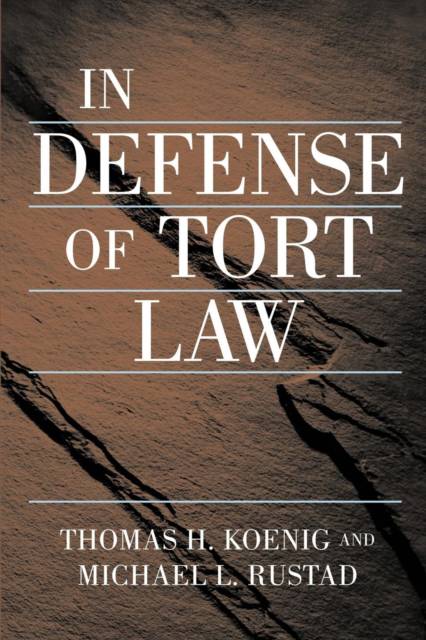
- Retrait gratuit dans votre magasin Club
- 7.000.000 titres dans notre catalogue
- Payer en toute sécurité
- Toujours un magasin près de chez vous
- Retrait gratuit dans votre magasin Club
- 7.000.000 titres dans notre catalogue
- Payer en toute sécurité
- Toujours un magasin près de chez vous
Description
Late night comedians and journalists eagerly seized upon the case of an elderly woman who sued McDonald's when she spilled hot coffee in her lap as a prime example of frivolous litigation. But as Rustad and Koenig argue, cases such as these are an incomplete and misleading characterization of tort law. Corporations have successfully waged a public relations battle to create the impression that most lawsuits are spurious, when in fact the opposite is true: tort law plays a crucial role in protecting consumers from dangerous and sometimes life-threatening hazards. Without legal remedies, corporations would suffer no penalty for choosing profits over public health and safely.
In Defense of Tort Law is the first book to systematically examine the social, legal and policy dimensions of the tort reform debate. This insightful analysis of solid empirical data looks beyond popular myths about frivolous lawsuits, and tackles a variety of contentious issues: Should punitive damages be capped? Who is favored by tort law? Who loses, and why?
Koenig and Rustad's detailed case study analysis also reveals disturbing gender inequities in a legal system that is largely dominated by men. Because women are disproportionately injured by medical products, impermissible HMO cost cutting, medical malpractice and sexual exploitation, restrictions on the rights to recovery in these fields inevitably creates gender injustice. Engaging and up to date, In Defense of Tort Law also identifies aspects of the current law that require further elaboration, including the need for measures to combat cybercrime against consumers.
Spécifications
Parties prenantes
- Auteur(s) :
- Editeur:
Contenu
- Nombre de pages :
- 345
- Langue:
- Anglais
Caractéristiques
- EAN:
- 9780814747582
- Date de parution :
- 01-10-03
- Format:
- Livre broché
- Format numérique:
- Trade paperback (VS)
- Dimensions :
- 154 mm x 227 mm
- Poids :
- 494 g







